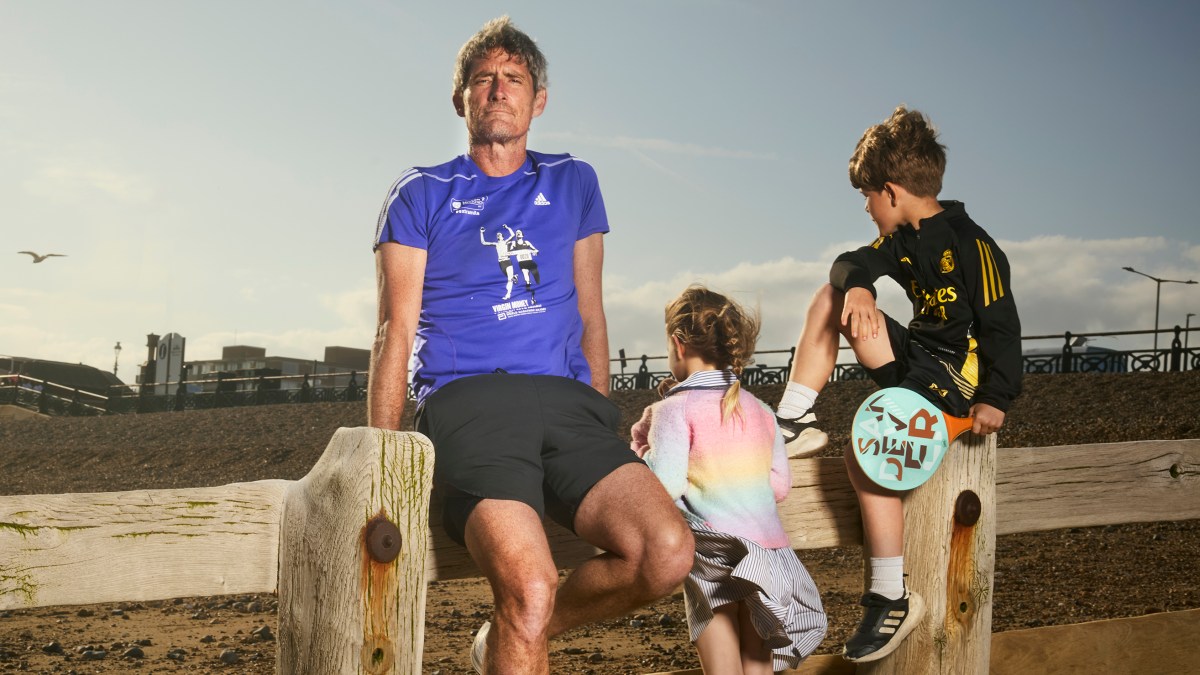Last Friday evening I went for a run. This was unusual for three reasons.
First, I tend to run in the mornings, before the news cycle devours the airwaves, before the anxiety builds, before my children wake and I begin questioning why I have brought them into this cul-de-sac world where, to me, hope is a rare earth metal — hard to find, difficult to extract. Given the darkness of this filter, it is perhaps unsurprising that I am someone who needs to get in their run early. Either you run the day or the day runs you, goes the adage, one to which I have clung, really clung, for the best part of this century.
Second, it was hot. Temperatures were in the high twenties when I started and they didn’t dip below the high teens, despite running at night.
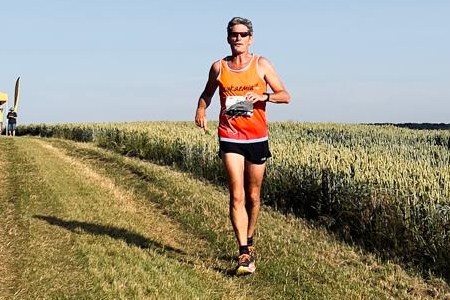
Jamie Doward doing his recent South Downs ultramarathon
COURTESY OF JAMIE DOWARD
Third, I ran 46 undulating miles. This was 20 miles further than I have run before (a marathon).
That I chose to run a backyard ultra (basically, you run the same 4.2-mile route every hour until you drop) up and down the South Downs was a jarring break with convention and a potentially disastrous life choice for someone who once considered himself addicted to running. This was a possible OD situation. There was a danger I might gorge myself on running with catastrophic consequences. True fact: I wrote my will hours before I started.
But no. There was no drama. I called it a day after 11 hours and loved every minute of it — the nocturnal birdsong, the hushed beauty of the English countryside bathed under a crescent moon, the fierce camaraderie of my fellow runners…
Last weekend would have been anathema to the old me — the runner who loved hitting personal bests, running on roads and pavements every day. He would have been furious with my ambling, guileless appreciation of my natural surroundings. Loser.
But the old me died a couple of years ago. These days I don’t run so much — maybe three or four times a week, 30-40km (18-25 miles) in total, nothing like the 100km or so I would clock up in a desperate, futile bid to banish the demons, demonstrate penitence and, all importantly, trigger the endorphin rush that would deliver a sweet release from crippling despair.
• Read more expert advice on healthy living, fitness and wellbeing
Running was once my ticket to the sunlit uplands. It was a natural selective serotonin reuptake inhibitor, which conferred desperately needed self-respect and wound back the clock on decades of hard living and bad choices that had left me ashamed, fretful and lost. The roots of this despair run deep and are manifold.
Over the course of many years, a confluence of factors came to stealthily lay the groundwork for me embracing an activity that I associated purely with liberation. To run was to be free, I believed, buying into the marketing hype of a thousand sports brands. Ergo, if I ran I was free. I could literally run away from it all, my past especially.
At school I ran to escape bullies
My early experiences of being bullied at school seem a good place to start when looking for clues as to how I ended up where I did. At break times, I was desperate to escape my tormentors through the simple act of fleeing. This isn’t easy when you’re being held down and punched in the face. But sometimes I could wrestle free and, if I kept moving, give them the slip, ride it out until the bell, achieve a temporary salvation.
Crippling low self-esteem, seemingly baked in from birth, which I masked through a carefully curated nihilism during my teenage years in which alcohol and cigarettes featured heavily, should be introduced to the mix. I could add impostor syndrome at an elite university, a physically and mentally scarring skin condition that left me despairing, possibly suicidal, unable to leave my room for days on end, engendering a fear of captivity that lingers even now.
Later still, I would include the relentless, paralysing stress that comes with working for a national newspaper. For many years I wrote about terrorism. This was the prism through which I came to see the world. I became horrified at our propensity to violence, how easily we could descend into it. I struggled to see the good in things, myself especially. Every massacre convinced me that the world was a dark and f***ed-up place.
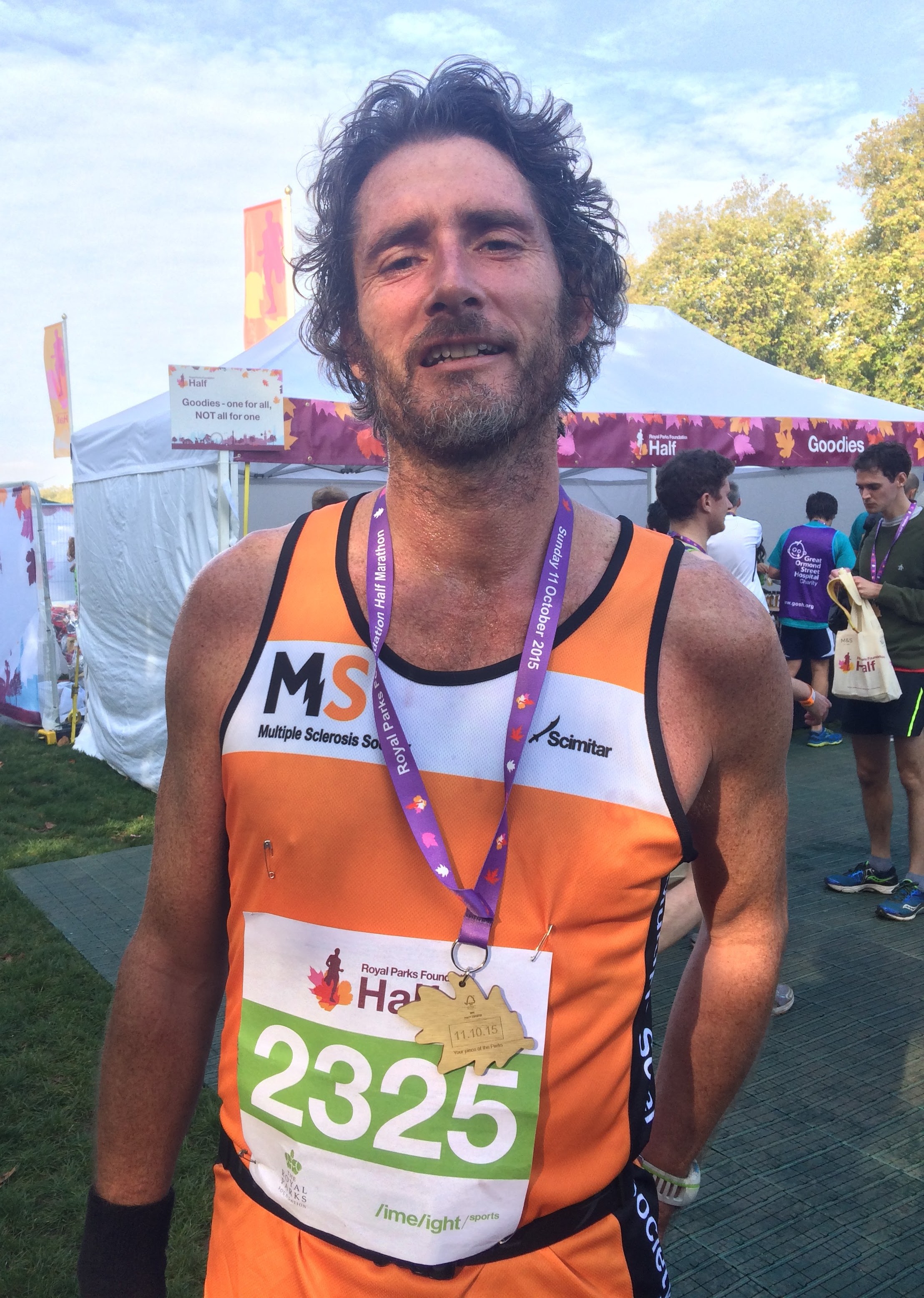
Finishing a half-marathon, London, 2016. “I ran faster and faster. Beating the clock, beating my old, worthless self became an obsession”
COURTESY OF JAMIE DOWARD
I started drinking heavily. The situation became so bad that at one stage I took a second job as a barman in our newspaper’s local because I was in it so much. They paid me in booze. The weight piled on, as did the self-loathing. I had created the perfect vicious cycle. I drank because I hated myself. I put on weight, made bad choices, hated myself more… Relationships were deliberately torpedoed whenever they looked promising. I was never going to spend a future with anyone but my worthless self. This was a solo act. There was no room for anyone who might threaten to act me off the stage.
• Are you a stress drinker? The signs — and how to break the habit
These were the conditions that laid the foundations for what was to follow.
When asked how he became bankrupt, the novelist Ernest Hemingway replied, “Two ways. Gradually, then suddenly.”
This was true of me and running.
The vulnerabilities that made me susceptible to running’s siren call were operating in deep waters. They never surfaced until much, much later. No, the ostensible trigger for my descent into running addiction was abrupt and comical. I ran out of pubs.
A few years into the new millennium, my office moved to a nowhere location that had yet to be claimed by the tech titans. With zero imagination and my proximity to revelry reduced, not just by the switch in geography but by my selfish hellraising peers settling down and raising families, I struggled to define myself.
I did consider cycling, but bikes were £5,000
Inchoate and aware that my best years had not so much slipped by as had been buried in a lead-lined box somewhere deep under the Arctic tundra, I opted to become a cliché. I hit the gym. To be fair, I did consider turning to cycling, but the bikes were £5,000 and I needed a quick, cheap fix, because I had zero belief that anything I chose as an alternative to my previous life would last. And yet I persevered, pounding the treadmill for ten, twenty, then thirty minutes and more, believing I could shed the consequences of years of self-destruction in just months.
After a year or so, it dawned on me that there was only so much of the Balearic nightclub vibe I could take from a gym and I ventured outside, running on canal paths, dodging the speeding cyclists and the snarling dogs. My drug was free, unlimited and wonderful, and I craved it all the more. I would push myself to run further and faster. The endorphins were magnificent. The validation intoxicating and inflationary. Beating the clock, beating my old fat, worthless self became an obsession and so inevitably I started running marathons — and that is when my obsession with running became all-consuming. I didn’t want to just run marathons; I wanted to run marathons. I wanted to achieve a sub-three-hour marathon — for many, the holy grail of marathon running.
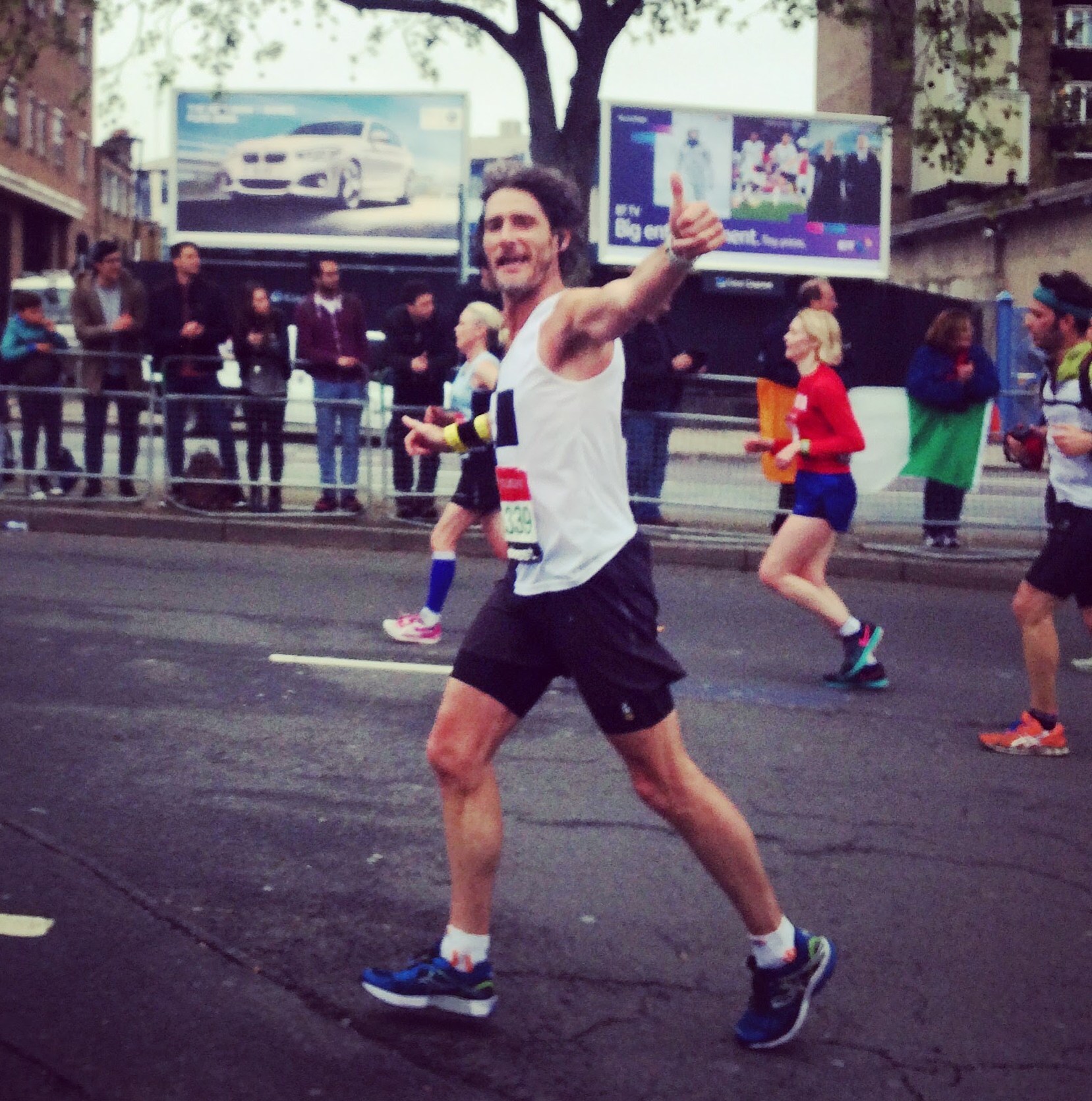
Running the London Marathon, 2015
COURTESY OF JAMIE DOWARD
For more than a decade, I tried to harpoon this whale. I studied books and training plans and watched countless YouTube videos. I hunted down hacks — beetroot juice, caffeine gels, peanut butter, so much peanut butter. I developed an acute appreciation of carbon fibre running shoes and their near-alchemic capacity for shaving minutes off my personal best. I was convinced the whale was mine for the taking. Running came to define me. It didn’t matter that I wasn’t particularly good at it. I had something and it was a lot better than the nothing that had preceded it.
I craved my daily fix in the sense that I became dependent on it. If I didn’t get it, I struggled to cope with the simplest challenges. I became anxious, crotchety and unmoored. I would lose perspective, a darkness would descend. I would lose my sense of self.
When I wasn’t running, I was thinking about running
When I wasn’t running, I would think about running. All the time. I couldn’t see around its edges, couldn’t see how my obsession was blinding me. All I could see was someone embracing a life-affirming lifestyle choice that had zero downside. Pity the poor individual who asked me what I did in my spare time.
The parallels with a religious conversion are hilariously obvious. I had dogma — so many books, so many apps and websites. And I had liturgy — marathons, half-marathons, 10km races, Parkruns, each a communal form of worship practised in lightweight vests and shorts that boasted moisture-wicking technology. Running became a form of daily baptism. Every run would allow me to enter the waters and emerge cleansed, renewed, my sins and regrets sweated out through my pores, decanted on pavements, treadmills and trails.
I practised my faith zealously. On our honeymoon on a tiny island off Madagascar, when each day I ran up and down its 700m-long beach to get in my daily 10km. The time I ran up Dead Woman’s Pass on the Inca Trail in Peru, some 4,200m above sea level, only to end up on my back, gasping for air, my tongue lolling out of my mouth, eyes bulging like a netted fish. The trips to Venice, Iceland, Kerala… I have run with a broken toe, a torn hamstring and the runner’s sworn enemy, the painful condition plantar fasciitis. I have run in hospitals awaiting the birth of my children. I have run in airports, on dual carriageways and around suicidal hairpin bends. When lockdown came, the fear of not being able to run for however long I desired triggered the urgent purchase of a running machine far too big for our house, which resided in the back garden under an old motorcycle cover.
The spin-offs were fantastic. I shed tons of weight. I slept better. I dramatically cut back on the drinking. Me and hummus, we became very good friends. So long as I had running, I had found a way of getting by. Running’s ability to unchain me from a dark, toxic world conferred on it near-magical properties. Navigating London’s streets on an early, somnolent Sunday morning became my way of banishing the horrors of a 24-hour news cycle that fed me a daily diet of beheadings, catastrophes, murder and mayhem.
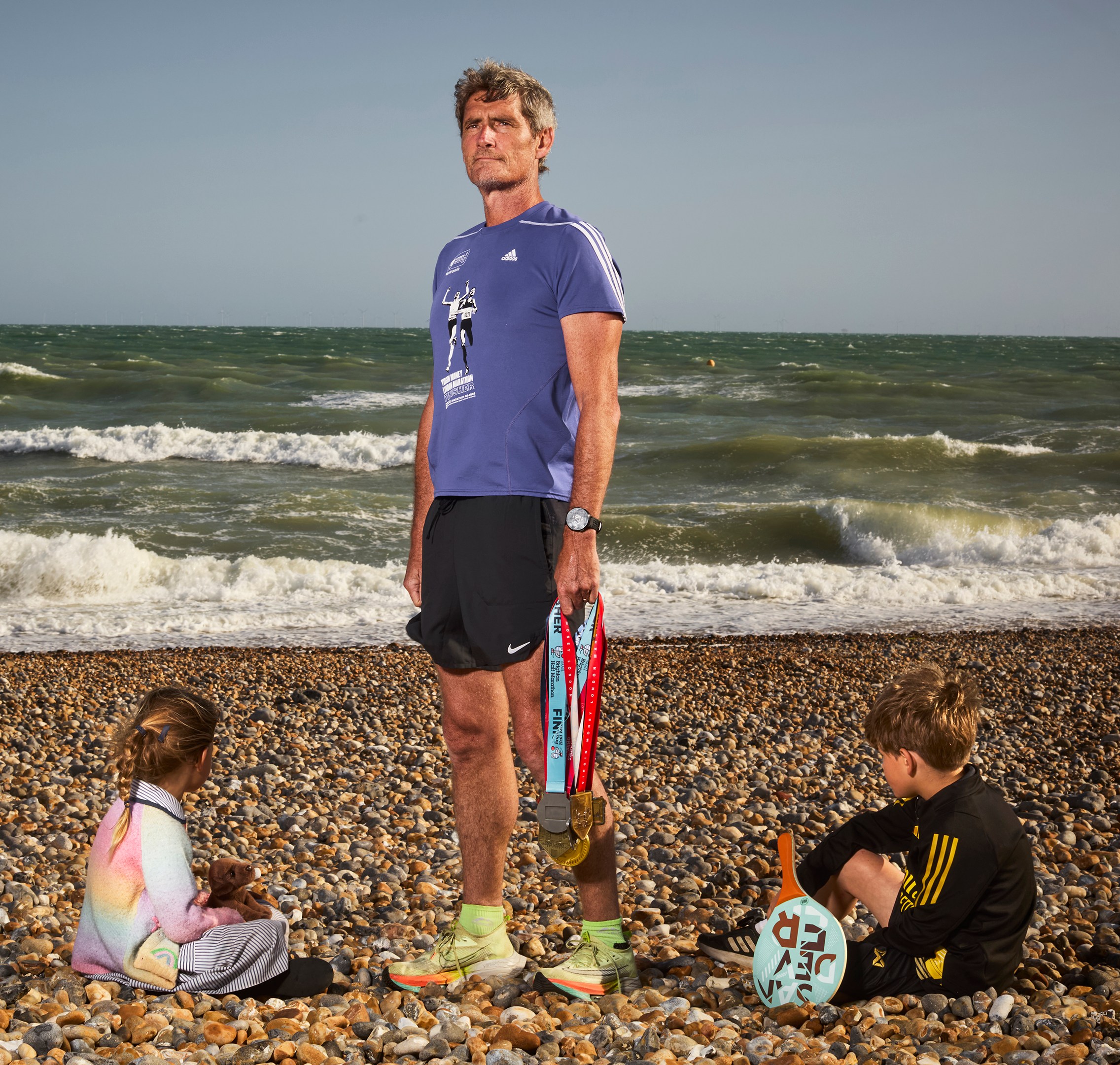
Doward and his children on Hove beach
JUDE EDGINTON FOR THE TIMES MAGAZINE
It was pure escapism, of course, an attempt at self-delusion. Sometimes I would convince myself I could arrest some impending horror if I could just hit a PB. The 2023 Titan submersible disaster, when there was still hope those on board were alive? I was running furiously on a treadmill, believing that my efforts could spare them. Whenever Isis posted a new threat to behead a hostage, I hit the pavement. Unhinged, I know. But I had nothing else in my armoury and I was desperate for something that would convince me I was not without agency. So long as I kept moving, I had control.
I was numb with grief
Then, one day, everything stopped.
Our daughter was very active in her mother’s womb. She had an amazing kick on her and we couldn’t wait for her to join her brother and complete our family. “Going to be a runner, like me,” I told others before I’d learnt her sex. Only, she wasn’t. Our daughter had a rare condition that meant, when she was born, she wouldn’t be able to survive for more than a few seconds outside her mother’s womb.
Numbed with grief for a future that wasn’t going to happen, my wife and I retreated into our home, wintered it out. I stopped running. I couldn’t see a way through. I couldn’t put one foot in front of the other. To run seemed sacrilegious, an affront to our daughter’s memory.
Weeks passed, but, of course — of course — at some stage I started running again, to exhaust myself, to make the anger go away, to use my body to communicate what words couldn’t, a coping mechanism I’ve employed whenever I’ve grieved the loss of someone close: an ex-girlfriend, my mother, a much loved member of my children’s school community. And so, after the death of our daughter, I continued my quixotic pursuit of running a sub-three-hour marathon throughout lockdown and countless other roadblocks, aware the death clock was ticking, that my window for achieving my life-defining goal was shrinking.
Only, something had changed. I had developed an understanding, almost imperceptible at first, but which was to grow in the years that followed our daughter’s death and her sister’s birth, that running was not a panacea. I realised that I had been using it to run away from things and that this, ultimately, was not healthy for me or my family.
All of this I came to appreciate when I was running those long, lonely miles on those long, lonely mornings. In this sense, running has been my guru and my parent. To feel truly liberated, I realised, you need to be comfortable within yourself, to admit your failures, to stand, or maybe run, on your own two feet. You cannot run from the past or your problems. Running made me see the truth of things.
Fight or flight? To run is to fight
Now that I don’t run so much, I love it more. I appreciate that it is a privilege to choose my direction of travel in a world where so many are denied this fundamental right, where walls, both metaphoric and real, are going up and where so many things seem out of our control.
I now realise that I used to run out of fear — fear of failure, fear of not being good enough, fear of the consequences of my past actions, fear of being a bad parent, husband or friend.
But these days, these turbulent days, I run to feel strong. Fight or flight? To run is to fight.
Incidentally, I never did run sub-three. My PB is 3 hours 17 seconds, since you’re asking. I’m happy to talk more about this if you’d like. Hello? Hello…? Are you still there?
And So I Run by Jamie Doward (Vertebrate Publishing, £14.95). To order, call 020 3176 2935 or go to timesbookshop.co.uk. Free standard P&P on online orders over £25. Discount available for Times+ members
